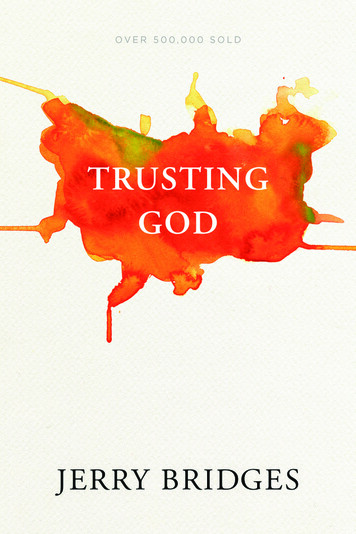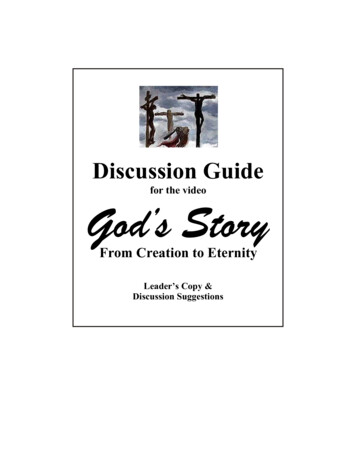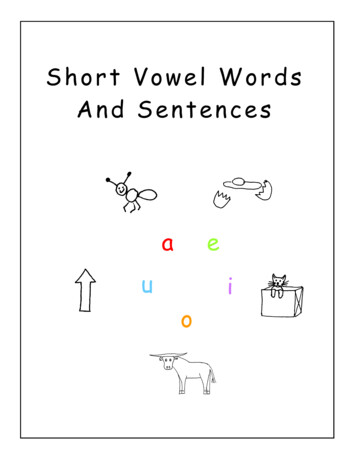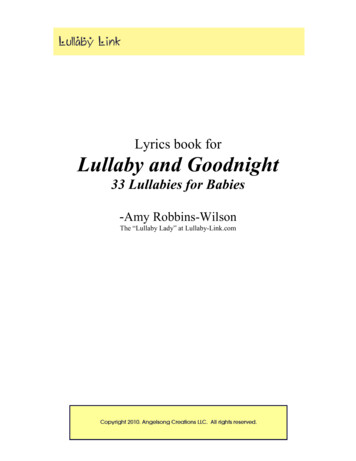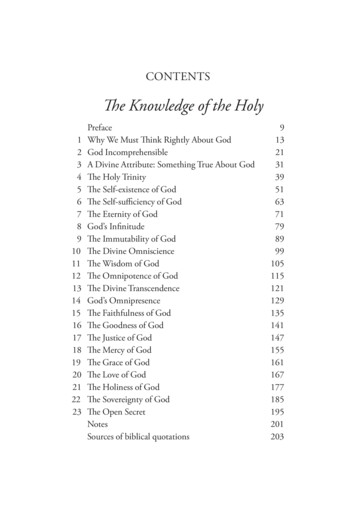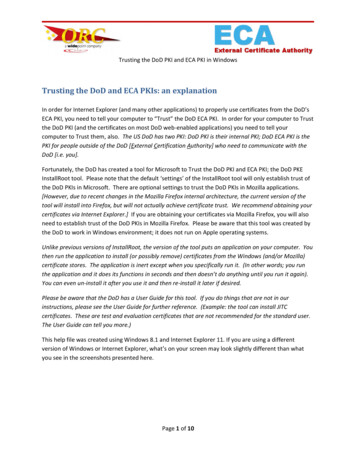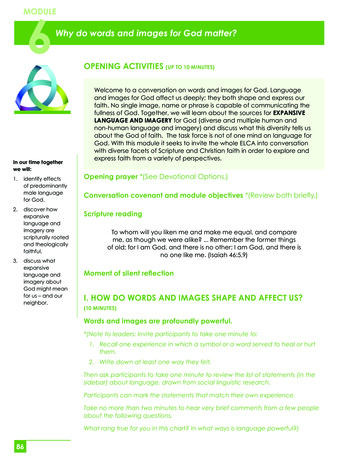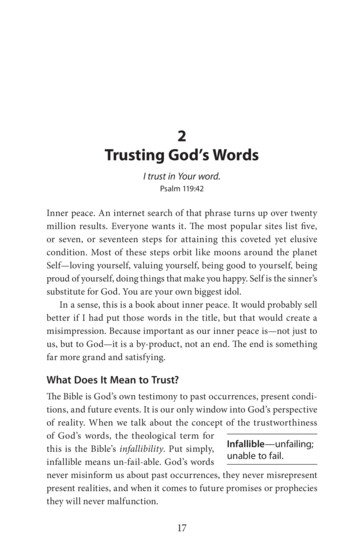
Transcription
2Trusting God’s WordsI trust in Your word.Psalm 119:42Inner peace. An internet search of that phrase turns up over twentymillion results. Everyone wants it. The most popular sites list five,or seven, or seventeen steps for attaining this coveted yet elusivecondition. Most of these steps orbit like moons around the planetSelf—loving yourself, valuing yourself, being good to yourself, beingproud of yourself, doing things that make you happy. Self is the sinner’ssubstitute for God. You are your own biggest idol.In a sense, this is a book about inner peace. It would probably sellbetter if I had put those words in the title, but that would create amisimpression. Because important as our inner peace is—not just tous, but to God—it is a by-product, not an end. The end is somethingfar more grand and satisfying.What Does It Mean to Trust?The Bible is God’s own testimony to past occurrences, present condi tions, and future events. It is our only window into God’s perspectiveof reality. When we talk about the concept of the trustworthinessof God’s words, the theological term forthis is the Bible’s infallibility. Put simply, Infallible—unfailing;unable to fail.infallible means un-fail-able. God’s wordsnever misinform us about past occurrences, they never misrepresentpresent realities, and when it comes to future promises or propheciesthey will never malfunction.17
THE TRUST WORTHINESS OF GOD’S WORDSThe assertion that God’s words are trustworthy is only a clinicalcanon in a catechism, however, until it impacts my personal response tothose words. God’s trustworthiness means that I am invited, obliged,and compelled not merely to believe His words but also to trust them.What does that mean?Learning from the ReformersProtestant theologians understood that all believing is not the same—aconclusion that is both intuitive and biblical.1 Some times they usedLatin words (in brackets below) to distinguish between differentcomponents of faith.2Faith is, first of all, a kind of knowledge [notitia]. The assump tion thatfaith is the opposite of knowledge is demonstrably mistaken. Everyone,down to the most anti-supernaturalistic atheist or evolutionist, believesthings he has never personally witnessed, experienced, or calculatedout—and operates on those beliefs as a form of knowledge. The reliabilityof that knowledge depends on two things: (a) the accuracy of the evidenceitself, and (b) the correctness of one’s interpretation of that evidence.Many legal court cases demonstrate not only that ‘evidence’ can beplanted, twisted, or partial but also that juries and judges weighing thesame evidence can come to very different conclusions.In the case of biblical faith, the content of belief is not what I desireto be true, nor is it defined by my personal imagination of what is orought to be true. The content of biblical faith is defined by the wordsof God, the Scripture itself. Paul implies this component of faith ashe recollects the beginning of the Thessalonian church, ‘when youreceived the word of God, which you heard from us’ (1 Thess. 2:13).Faith begins with knowledge: acquaintance with certain necessaryfacts. In Jesus’ parable of the soils, the first kind of hearer—thehardened wayside soil—doesn’t even make it this far. He ‘hears the1. There is a kind of faith that justified Abraham (James 2:23), a kind of faiththat that does not save (James 2:14), and even a kind of faith possessed by demons(James 2:19).2. Cf. Turretin 1994, pp. 560-64; à Brakel 1993, pp. 263-66, 270ff. For a moreacces sible summary, see Sproul 1995, pp. 75-91.18
TRUSTING GOD’S WORDSword’ but ‘does not understand it’ (Matt. 13:19) because it lies atop anunreceptive, uninterested heart and penetrates no deeper. So ‘the devilcomes and takes away the word out of their hearts, lest they shouldbelieve and be saved’ (Luke 8:12).Second, biblical faith doesn’t stop with merely knowing whatGod says; it also acknowledges (assents) that what God says is so[assensus]. Paul implies this component of faith when he adds that theThessalonians who heard God’s word from the apostles ‘accepted it notas the word of men but as the word of God’ (1 Thess. 2:13 ESV). Youcan see the progression from knowledge to acknowledgement, fromawareness to assent. Another example of this level of response is thesecond kind of soil in Jesus’ parable, represented by ‘the ones on therock who, when they hear the word, receive it with joy. But thesehave no root; they believe for a while, and in time of testing fall away’(Luke 8:13 ESV). There is an immediate and even emotional receptionof what they hear. The ‘rock’ is a reference not to stony soil but to ashelf of stone just beneath the surface; that’s why they ‘have no root,’no depth of commitment. 3 The response, though emotional, is shallow,superficial, and temporary. Jesus indicates that this kind of responsefalls short of genuine or lasting faith.A third component of biblical faith is a personal persuasion that acts[fiducia]. Full-grown faith is confident in the reliability of God’s words tothe point that it operates on the basis of what God says. That’s why Paulcaps off his Thessalonian reminiscence by noting that the word of God—which they heard [notitia] and acknowledged as divinely authoritative[assensus]—‘performs its work in you who believe’ (1 Thess. 2:13NASB). That’s fiducia, when one acts on what he has both heard andacknowledged, by putting his faith in (entrusting himself to) God andHis word. (That’s why older theologians used to refer to a genuineChristian believer as a fiduciary.) Returning to Jesus’ parable, the fourthexample is ‘good soil.’ These, Jesus says, are ‘the ones who, after hearingthe word, cling to it with an honest and good heart, and bear fruit with3. The translation ‘rocky’ (NASB, NIV) is unfortunate. The text literally reads‘the ones upon the rock [singular],’ describing a thin layer of soil sufficient for theseed to sprout initially but not to survive (Cranfield 1985, p. 149).19
THE TRUST WORTHINESS OF GOD’S WORDSsteadfast endurance’ (Luke 8:15 NET). Personally and whole-heartedlyembracing God’s words—that’s trust. And that’s life-changing.In the context of salvation, it’s not some higher sense of completetrust [fiducia] that saves apart from knowing truth [notitia] andacknowledging its truthfulness [assensus]. ‘None of these elements,even fiducia, taken alone or separately, is a sufficient condition forsaving faith. All three are essential to it’ (Sproul 1995, p. 75). All threeare necessary components of a faith that saves.Components of Biblical FaithKnowledgeAssentTrustNotitiaAssensusFiduciaOne can haveknowledge withoutassent or trustOne can have assentwithout correctknowledge or personaltrustOne can have trustwithout correctknowledge or completeassentSo is faith intellectual? Or emotional? Or volitional? The answer isyes. Saving faith is more than just knowledge or even assent; bothknowledge and assent must find their way to activating the will to chooseto trust what is known and assented, ‘to cling to it with an honest andgood heart’. In that sense, faith is ultimately seated in the will (à Brakel1993, p. 278). The will is like the third number to the combinationlock of the human heart. It is possible to dissect the process of faithin order to isolate and differentiate between our faculties of intellect,emotion, and volition, so that we can better understand the individualrole played by each; but they cannot be ‘fully distinguished when manis operative’ because in reality they all function together.4How is a field tilled? By the farmer, the plow, or the horse? (Or, if youprefer a more modern image, by the farmer, the disc, or the tractor?)None of them individually, nor even any two of them together, can tillthe field; the field is plowed only when all three work in unison.4. ‘Applying this to faith, this means that the believing soul is engaged inunderstanding, willing, and desiring. When a man believes, all his facultiesfunction simultaneously’ (à Brakel 1993, pp. 270-71).20
TRUSTING GOD’S WORDSMoving from Saving Faith to Sanctifying FaithTheological discussions of the nature of faith have historically focusedspecifically on defining saving faith. The same is true, however, of whatmight be called sanctifying faith. Under standing the components of faith is just Sanctification—setapart to God and madeas important for Christian living as it ismore like Christ.for becoming a believer in the first place.Unfortunately, becoming a believer doesn’t mean that I auto mati callynow fully trust everything I read in the Bible. I should; but often I don’t.Believers still struggle with coming to trust all of God’s words and livingout that trust in their daily experience. Because even as a believer I stillcarry around inside me a fallen nature (whatTrust is definedthe New Testament calls ‘the flesh’) that isby our choicesincurably disinclined to trust God. Faith is notand revealed ina static, inanimate commodity. Faith needs toour behavior.grow (see Luke 17:5; 2 Cor. 10:15; 2 Thess. 1:3).Believers never permanently plateau so that they always makedecisions and react to situations in a way that displays a steady,unbroken trust in God. Even the mighty Elijah tumbled from thesummit of an intrepid trust in God (1 Kings 18) to bolting at theimpotent threats of an irate queen (1 Kings 19).5 When Elijah fled forhis life into the wilderness, God’s response was frank and succinct:‘What are you doing here, Elijah?’ The question was pregnant withinnuendo: You can trust me to rescue you from hundreds of paganprophets but not from one wicked woman? You can trust me to delivera bolt out of the blue to ignite wet wood and lick up ditchwater, but notto douse a little pagan indignation? How could Elijah fall so far so fast,from fearless trust to fright and flight? Because, as James reminds us,he was only human just like us (James 5:17).We have an internal barometer that measures our trust (or lackof it). Its reading registers the condition of our spirit on a spectrum5. For a different take on this chapter in Elijah’s life see Davis 2007, pp. 25370. Davis’ thoughtful and text-focused exposition is a good corrective to someexcesses, though I don’t find all of his analysis convincing.21
THE TRUST WORTHINESS OF GOD’S WORDSranging from peace to panic, revealing our soul’s sense of security oranxiety. Those internal readings inevitably transmit to our attitude,our demeanor, even our countenance. Consider two brief illustrations.The first illustration comes from the New Testament. The ApostlePaul, on his way to Rome as a prisoner, was convinced that any attemptto sail on into the tail end of the year would be fraught with danger,damage, and probably loss of life (Acts 27:10). Sure enough, the shipsailed into a storm so terrific that ‘all hope that we would be savedwas finally given up’ (27:20). But the Lord sent an angel to assure himthat though the ship itself would be lost, no lives would be (27:23-24).Paul’s personal belief in those words from God (27:25) had a powerfulimpact not only on his own spirit, emotions, and actions, but on thoseof the ship’s crew and passengers as well. On the basis of his ownconfidence in God’s words, he urged them not to be afraid (27:24) butto take courage (27:22, 25). After two tempestuous weeks at sea, Paulpressed them to eat some food and assured them that ‘not a hair willfall from the head of any of you’ (27:34). Then, giving ‘thanks to Godin the presence of them all,’ Paul began to eat (27:35), as though theywere in no more danger than if they were sitting safely ashore. Thebasis of Paul’s trust was the words of God. The effect of Paul’s trust?‘They were all encouraged, and also took food themselves’ (27:36). Thewhole passage is richly colored with the emotional impact of trust; itshows up in hues of confidence, security, relief, and reassurance.The second illustration comes from the OldWhen we areTestament. When the barren Hannah went totruly trustingthe tabernacle to pray for a son, she was miser God’s words,able, tearful, grieved, and in bitterness of soulit has aover her childlessness (1 Sam. 1:6-8, 10, 15). Buttransformingwhen Eli the high priest blessed her with theimpact insideassurance that God would grant her petitionand out.(1:17), she ‘went her way and ate, and her face wasno longer sad’ (1:18). Hannah did not merely believe that God could (i.e.,was able to) give her a child; she was persuaded that God would hearand grant her prayer for a child, based on bona fide word from God’spriestly spokesman. Her trust totally transformed not just her spirit22
TRUSTING GOD’S WORDSbut even her countenance, even though nothing in her circumstanceshad changed. When we are truly trusting the words of God, it has atransforming impact inside and out.‘Believing’ and ‘Trusting’ the BibleThe fact that even English uses two different words with distinctnuances—sometimes interchangeably, but sometimes not—confirmsour innate understanding that there can be a difference between beliefand trust. Believing and trusting are twins;Nuance—shadeand like twins, there are distinctions as well asof meaning.similarities.As in English, the Hebrew Old Testament has two different wordsto highlight the potential distinction between believing and trusting.The Greek Septuagint recognized and preserved the difference betweenthose two Hebrew words. It routinely renders the primary Hebrewword for believing (’āman) with theprimary Greek word for believing Septuagint—a pre-ChristianGreek translation of the(pisteuō). But the Old TestamentHebrew Old Testament.word for trusting (bātach) Godis always rendered with the Greek word for hoping (elpizō)—a wordthat the Bible usually uses to denote not just optimism but confidentanticipation (Oswalt 1980, I:101-02). The Greek New Testamentcollapses the ideas of believe and trust into a single word (pisteuō).6The fact that the New Testament routinely merges both nuances doesn’tmean that the emotional component of trust is dropped but, rather, thatit is folded into what becomes the primary New Testament expressionfor our response to God’s words.Believing (’āman) is predominantly an act of thinking and dealswith processing information (facts or claims). Trusting (bātach) is thechoice to act on that knowledge; in that sense it is an exercise of the6. Though the NT predominantly relies on pisteuō to convey both believingand trusting, it also occasionally employs distinctive language for trust includingwords for hope (elpizō and cognates—John 5:45; 2 Cor. 1:10; Eph. 1:12; 1 Tim.4:10, 5:5; 1 Pet. 3:5) and persuasion or confidence (peithō and cognates—Luke 18:9;2 Cor. 1:9, 3:4).23
THE TRUST WORTHINESS OF GOD’S WORDSwill, as I mentioned earlier. But trusting also denotes an emotionalexperience, ‘that sense of well-being and security which results fromhaving something or someone in whom to place confidence,’ and‘stress[es] the feeling of being safe or secure’ (Oswalt 1980, I:101). That’sthe inner peace I talked about at the beginning of the chapter.You can genuinely believe something factually and yet refuseto trust it personally. It’s not at all uncommon to use ‘believe’ in atechnical, impersonal, creedal sense that doesn’t match my actionsor attitudes. Some people believe that airplanes can and do fly safelyand successfully every hour of every day, but they would never dreamof actually getting on one. Their refusal to set foot on an airlinerdoes not mean that they don’t really believe that planes can fly; theyknow they can. It’s an issue of trusting personally what they believefactually.Greek scholar Daniel Wallace describes how his once vibrant,personal relationship with the Lord was gradually replaced by a kindof clinical orthodoxy.7 He got in the habit of approaching the Biblefrom a purely professional and academic perspective that eventuallydepersonalized his relationship to God’s word and, consequently, toGod Himself. It took the providential piling up of painful trials inhis family life for Wallace to discover that there was no solace in themere technicalities of the biblical languages. God graciously usedaffliction to reawaken in him a thirst for a relationship with GodHimself. That relationship is the heart of genuine Christianity; andthe heart of that relationship is the Scripture. The Bible is a profoundlyrelational document. But when it is isolated from God as an object foricy exegetical dissection, he says, ‘our stance changes from “I trust in”to “I believe that”’ (Wallace 2005, p. 9). Believing and trusting are notnecessarily the same thing. And the difference can be life-altering.So, is believing inferior to trusting? No, that’s not the point. But itis possible to believe without trusting—like the guy who sees planesoverhead all day long yet refuses to fly, or the housewife who fusses7. Wallace describes this personal experience in his preface to Who’s Afraid ofthe Holy Spirit? See Wallace 2005.24
TRUSTING GOD’S WORDSand frets over the bills even though sheTrusting completesbelieves that God provides for His own, orbelieving.the father who subscribes to the doctrinethat God sovereignly rules over the affairs of men and yet is constantlyout of sorts over the prosperity of the wicked in society. Believing isincomplete without trusting. Trust completes belief.Trusting is a willingness to rely on what is believed that producesa sense of confidence, safety, security, optimism. In fact, those are thevery words used to translate the Hebrew noun trust (betech). They areall words of feeling; but they are feelings that are properly groundedin thinking and believing the right things. Our sense of confidence,safety, security, and optimism registers the degree to which we notonly believe the word of God but trust the words of God.So, trust is both an action and a result. It is deciding to lean allyour weight on a word from God; that’s the action. And it is theserenity, security, and confidence you experience when you do; that’sthe result.Trusting What, Exactly?This sense of security or optimism is not, however, merely an abstract,subjective, nebulous, indefinable ‘mood.’ Our ground for trusting Godis not what we think Him to be, or assume He should be. Our onlyground for trusting God is what He says He is like and what He saysHe will do. The process works like this, from the bottom:Trust/Confidence/Security in God Belief in God Revelation of God Character of GodTrusting God is the fruit of believing God; and the only wayto believe God is to believe His revelation—what He says aboutHimself and about everything else. And the ultimate basis for25
THE TRUST WORTHINESS OF GOD’S WORDSbelieving and trusting God’s words is His character (ultimately,His trustworthiness). 8 ‘Unlike pagan religions where unremittedanxiety was the rule, the Hebrew religion knew a God whose chiefcharacteristic was faithfulness and trustworthiness’ (Oswalt 1980,I:102). The Christian religion is the sequel and heir to the Hebrewreligion, authored by the same God. That’s why this book is focusedon finding your safety and security, your confidence and optimism,in the God whose words are trustworthy because He is.It may help to return to the context of salva Soteriology—tion for an illustration. In soteriological terms,what the Biblebelieving God’s words secures salvation, whereasteaches abouttrusting God’s words produces assur a nce ofsalvation.salvation.SalvationBelief DeliveranceTrust AssuranceResult: Factual SecurityResult: Felt ConfidenceSomeone objects, ‘Belief isn’t really belief if I’m anxious or apprehensiveabout the proposition I say I believe.’ If that’s true, then anyone whoever wrestles with assurance of salvation cannot be saved, because‘belief isn’t belief if I’m anxious or apprehensive’; and if they don’tbelieve, then by definition they aren’t saved. But both Scripture andexperience suggest that something else may be going on in such cases;and often it is a disconnect between belief and trust.Yet the objection makes a valid point because, as I argued above,saving faith does involve trust. Sometimes, however, such faith candevelop a hairline fracture between trusting the propositions of thegospel (that God can save and this is how He does it) and trustingthe personal effect of the gospel (that God really has saved me).Hairline fractures are slight, but they can still be intensely painfuland debilitating. Also known as stress fractures, these fatigue-inducedfractures are caused by repeated stress over time. That’s a pretty8. This is explored in detail in Chapters 3 (‘God’s Jealousy for His Integrity’)and 5 (‘The Theological Foundation for God’s Trustworthiness’).26
TRUSTING GOD’S WORDSaccurate way to describe the spiritual phenomena that can contributeto doubting one’s salvation.9That’s why some people who truly believe the gospel can wrestlewith doubts about their salvation, sometimes for years. John Bunyandid; just read his autobiography Grace Abounding to the Chief ofSinners. Lots of things can contribute to this, but one is a failure totrust in the truth of the Gospel despite belief in the facts of the Gospel.It is one thing to believe God’s Word—mentally, intellectually, andquite genuinely. It can be quite another to trust God’s words, to leanall your weight on the specific statements of God about what He hasdone, what He will do, and what He is like. When you do that, youexperience the rest, security, confidence, and peace that comes fromthe persuasion that He truly is what He says and that He will reallydo what He says. Both of those are wrapped up in a biblically robustunderstanding of faith. But it is possible to have one without the other.Put another way, it’s one thing to believe that God can but anotherthing altogether to believe (trust) that He will. We’ll explore thatconcept further in a later chapter.The larger point here is that the ultimate object of belief and trustis God. But the crucial link between my belief/trust and God is thewords of God. Why? Because they are the only means by which I canknow God Himself.So the ultimate object of trust is the person and character of God;but the immediate object of trust is the words of God by which Hecommunicates His person and character. This book is devoted tofleshing out that idea. For the sake of present illustration, however,one passage will serve: Psalm 56.A Madman’s Trust in God’s WordsWhile hiding from King Saul, David decided to hole up in the Philistinecity of Gath (Goliath’s hometown). It was a brilliant strategy becauseit was the last place Saul would ever expect David to go. But it was9. Those phenomena, usually patterns of action or thinking over time, mayinclude tolerance of sin, an excessive tendency towards introspection, a mis understanding of the total grace of the gospel, or any number of other causes.27
THE TRUST WORTHINESS OF GOD’S WORDSalso risky; he might be identified as the guy who knocked off theirchampion. Sure enough, someone recognized him.David had to react in a heartbeat. ‘So he changed his behaviorbefore them, feigned madness in their hands, scratched on the doorsof the gate, and let his saliva fall down on his beard’ (1 Sam. 21:13). Itwas a crazy idea (literally). But it worked!We might be tempted to credit David’s hair-breadth escape toquick wits and consummate theatrical skill. The narrative makes noattempt to interpret David’s deliverance to divine intervention, director indirect. That interpretation is left for Psalm 56. And David had nodoubts about it: it was God.The ancient subtitle to Psalm 56 links this Davidic poem to the time‘when the Philistines captured him in Gath.’ Listen to the refrain hefolds into this hymn of praise for God’s protection:When I am afraid, I put my trust in You. In God, whose wordI praise, in God I trust; I shall not be afraid. What can fleshdo to me? (56:3-4 ESV)Then my enemies will turn back in the day when I call. ThisI know, that God is for me. In God, whose word I praise, inthe LORD, whose word I praise, in God I trust; I shall not beafraid. What can man do to me? (56:9-11 ESV).David blends his trust (the word is bātach) in God with his praise forGod’s words. What’s the connection? The object of his trust is GodHimself, but the content of his trust is God’s word (Kidner 1973, p. 203).Because God is known for keeping His promises,‘to praise God’s word is to praise the veryTrust replacesattribute that the one praying is depending onfear.for his deliverance’—His trustworthiness to dowhat He has said (Tanner 2014, p. 484). And the praise he trumpetsfor God’s word in 56:4 he repeats twice in 56:10.By the way, notice what his trust replaces: ‘In God, whose wordI praise, in the LORD whose word I praise, in God I trust; I shallnot be afraid.’ Fear is not primarily an intellectual experience but anemotional experience. Why will he not be afraid? Because he doesn’t28
TRUSTING GOD’S WORDSjust believe in God, he trusts God. And the emotion of trust replacesthe emotion of fear.Putting his fear aside, the psalmist praises the promisesof the Lord. After all, trusting in the Lord requires a priorcommitment to the revelation of God in his Word. He restson the promises of the Lord, as he praises the Lord of promise(VanGemeren 1991, 5:399, 401).You can hear the explicit connection between trust and God’s words—‘the revelation of God in his Word the promises of the Lord’. Whatpromises? At the very least, David had God’s promise that he wouldsucceed Saul as the next king of Israel (1 Sam. 16:1-13). It was God’swords that informed and fed his trust in God.‘You just need to trust in the Lord,’ someone may exhort. Fine, buthow do I do that? What about Him do I trust? Who is He? What is Helike? What has He done? What does He promise to do? There is onlyone way to know and one place to find the answers to any of thosequestions—the words of God Himself. We trust God by trusting Hiswords. Trust in God that is not grounded in the words of God is fantasy.What Does It Mean Not to Trust God’s Words?What is the alternative to trusting God’s words? The opposite oftrusting God is not trusting nothing. No one trusts nothing. Life isnot livable without trust. Everyone trusts someone or something—it’seither God, or self, or someone else. The oppositeof trusting God is trusting the wrong thing.No one trustsC. S. Lewis captures the spirit of self-trust innothing.The Last Battle. Jaded by a series of charades, thedwarves are determined never again to be ‘taken in’ by (in other words,trust) anyone. They’ve even become agnostic about the reality of Aslanhimself, withdrawing like turtles into a shell of inflexible skepticism.Their mantra is, ‘The dwarves are for the dwarves!’ There is hardly asadder image in Lewis’s final chronicle of Narnia than the dwarves’self-willed blindness that mistrusts everything and everyone excepttheir utterly blind and erroneous selves.29
THE TRUST WORTHINESS OF GOD’S WORDS‘You see,’ said Aslan. ‘They will not let us help them. They havechosen cunning instead of belief. Their prison is only in theirown minds, yet they are in that prison; and so afraid of beingtaken in that they cannot be taken out’ (Lewis 1970, p. 148).10‘Cunning instead of belief.’ The Bible has a great deal to say not onlyabout trusting God but also about the wrong things we are inclined totrust instead of God. The potential objects of misplaced confidence arelegion. Some of them we can relate to immediately—like trusting inwealth (Mark 10:23), or your own righteousness (Ezek. 33:13). Others,at first glance, may not seem to apply to us.For example, the Bible prohibits trust in Egypt, chariots, idols,swords, and bows. Trusting in these is not a big temptation for us.Or is it? The reason that these seem so exotic and inapplicable to usis because God was making very direct application to His originalaudience in their time and culture. The details may differ for us, butthe underlying issues are still the same because people are still thesame; so we’re inclined to put our trust in, not the same things, butthe same kinds of things.These days you’d be crazy to put your trust in Egypt (Isa. 36:9),but we can still be inclined to put our confidence in the weaponry(Isa. 31:1, ‘horses and chariots’) and military might of countries thatseem to us to be invincible (Hosea 10:13 ESV, ‘the multitude of yourwarriors’). You’ve probably never felt convicted about trusting in‘fortified’ cities (Deut. 28:52). But what about other things you’ve put inplace to protect yourself from physical danger or material loss? Locksand bolts, state-of-the-art security systems, the Glock 9mm in thebedside table drawer, salary, employment, bank accounts, insurance10. Not all failure to trust takes the form of ‘cunning instead of belief.’ But ifyou want a biblical example of that same phenomenon, read Isaiah 7. King Ahaz,a wicked king but under the protections of the Davidic covenant, was in dangerof a conspiracy to dethrone him. God graciously promised him deliverance, andoffered Ahaz his choice of a miraculous confirmatory sign. The king’s reply was‘cunning’ cloaked in the garb of humility: ‘I will not ask, and I will not put theLORD to the test’ (7:12). In reality, he had no interest in trusting God. He alreadyhad his own strategy for dealing with the threat; he was trusting in a bribedmilitary alliance with Assyria.30
TRUSTING GOD’S WORDSpolicies, retirement investments. None of theseLocus—theare wrong. But relying on any of them as the basisplace whereof your confidence and security is wrong. That’ssomething iswhat God is saying when He challenges the locus situated.of our trust in a passage like Deuteronomy 28:52.Probably no one in our Western culture thinks of himself as anidolater; that’s only for pagans in poverty-stricken, education-deprivedforeign countries. But trusting in idols (Isa. 42:17) is merely shorthandfor finding our security in anything other than, or more than, God—especially anything devised, created
steadfast endurance’ (Luke 8:15 NET). Personally and whole-heartedly embracing God’s words—that’s trust. And that’s life-changing. In the context of salvation, it’s not some higher sense of complete trust [fiducia] that saves apart from knowing truth [notitia] and acknowledg
